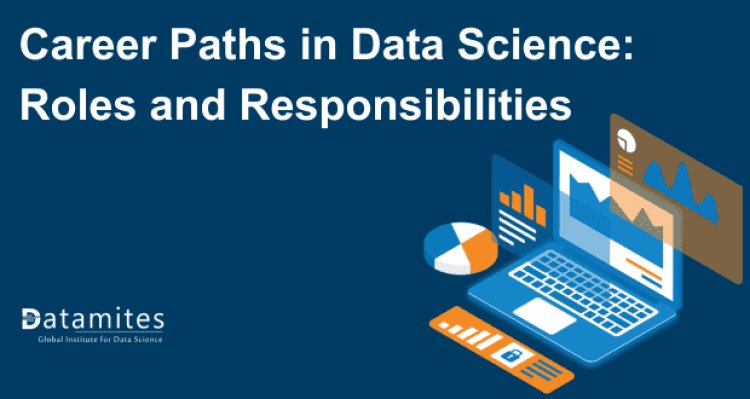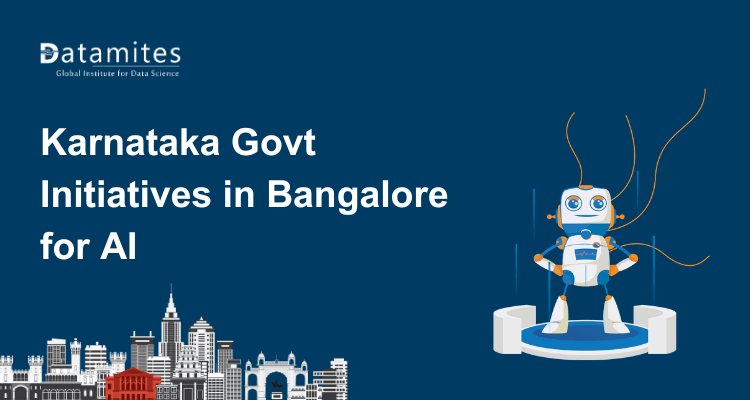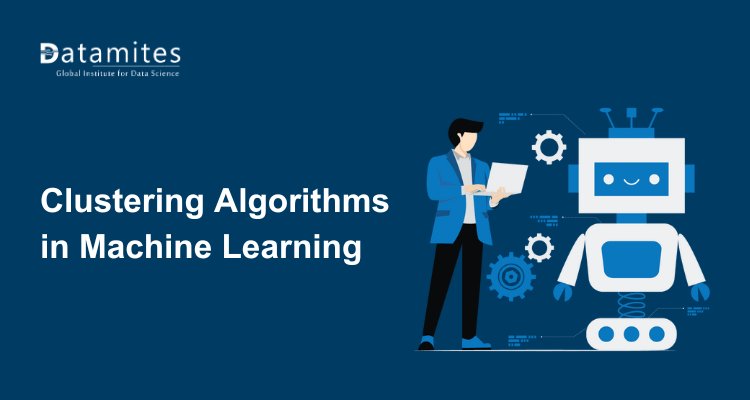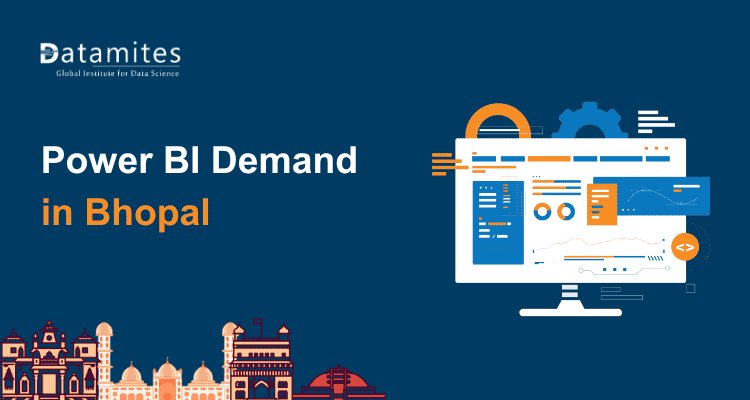Career Paths in Data Science: Roles and Responsibilities

Data science is rapidly growing, with demand for professionals expected to rise by 28% by 2026, surpassing most other fields. This growth highlights the crucial role data science plays in our data-driven world, impacting areas like healthcare and finance.
Data science blends statistics, computer science, and industry knowledge to extract valuable insights from large datasets. These insights help organizations make informed decisions, enhance efficiency, and stay competitive. As data volumes increase, the significance of data science continues to grow.
This blog post will explore various career paths in data science, detailing essential skills, educational requirements, and emerging roles. Whether you're new to the field or seeking specialization, this guide will help you navigate the diverse opportunities available.
Understanding Data Science
Data science is often described as the intersection of statistics, computer science, and domain knowledge. It involves gathering, handling, and examining data to reveal patterns, trends, and insights that can guide strategic decisions. However, data science is more than just crunching numbers; it requires creativity and critical thinking to turn data into actionable information.
The scope of data science is vast, encompassing various domains such as machine learning, data engineering, data visualization, and business intelligence. This multidisciplinary nature allows data scientists to work in different industries, solving problems specific to their domain of expertise. From predicting customer behavior in retail to optimizing supply chains in manufacturing, the applications of data science are limitless.
Refer these articles:
- The Role of Statistics in Data Science
- Subjects in Data Science
- Exploring Core Data Science Concepts
Skills and Education Requirements for Data Scientists
Becoming a data scientist requires a blend of technical, analytical, and soft skills, alongside a solid educational background.
Technical Skills: The Backbone of Data Science
To excel in data science, you'll need a solid grasp of various technical skills:
- Programming Languages: Proficiency in languages like Python, R, and SQL is essential for data manipulation, analysis, and building machine learning models.
- Data Manipulation and Analysis: Skills in handling and analyzing large datasets using tools like Pandas, NumPy, and databases are crucial.
- Machine Learning and Statistical Modeling: Knowledge of machine learning algorithms and statistical methods is key to creating predictive models.
- Data Visualization Tools: Familiarity with tools like Tableau, Power BI, and Matplotlib helps in presenting data insights visually.
Soft Skills: The Human Side of Data Science
Beyond technical expertise, data scientists need strong soft skills to excel in their roles:
- Problem-Solving Abilities: The ability to approach complex problems methodically and creatively is vital.
- Communication Skills: Data scientists need to clearly convey their results to stakeholders who might not have a technical background.
- Business Acumen: Understanding the business context in which data is used helps in creating solutions that align with organizational goals.
- Teamwork and Collaboration: Working well in teams, often with cross-functional members, is essential for successful data science projects.
Education and Certifications: Building a Strong Foundation
Recommended Degrees and Courses: A degree in computer science, statistics, mathematics, or a similar field is usually necessary to enter the field of data science. Additionally, enrolling in reputable data science training courses or bootcamps can provide valuable hands-on experience and exposure to real-world problems.
Continuous Learning and Upskilling: The field of data science is dynamic, with new tools, techniques, and methodologies emerging regularly. Staying current through continuous learning, attending workshops, conferences, and engaging in ongoing data science training is essential for maintaining and advancing your skills.
Refer these articles:
- What is Certified Data Scientist Course?
- What is Datamites Certified Data Analyst Certification
- What Is AI Engineer Course?
Popular Career Paths in Data Science
Data science provides various career paths, each with distinct focuses, tools, and skill sets. Here are some of the most sought-after roles in the field:
1. Data Scientist
Data scientists play a crucial role in analyzing and interpreting complex data to support organizational decision-making. They tackle projects that include predicting customer behavior and refining marketing strategies. Their responsibilities span the entire data science process, from data collection to model development.
Key Responsibilities and Typical Projects
- Data Exploration: Analyzing patterns and trends in extensive datasets.
- Model Development: Developing predictive models through machine learning methods.
- Insight Communication: Presenting findings to stakeholders to inform decision-making.
Required Skills and Qualifications
- Strong programming skills in Python or R.
- Experience with machine learning algorithms.
- Expertise in data visualization software such as Tableau or Power BI.
Average Annual Salary for Data Scientists
- The average annual salary for a Data Scientist in India is approximately ₹14,07,500 (Glassdoor).
- According to Glassdoor, the average annual salary for a Data Scientist in the US is around $158,315.
2. Data Analyst
Data analysts specialize in interpreting data to address specific business challenges. Unlike data scientists, their role centers on descriptive and diagnostic analysis. They employ statistical tools to uncover trends, generate reports, and deliver actionable insights.
Key Responsibilities and Tools Commonly Used
- Data Cleaning: Data Cleaning process ensures that the data is accurate, complete, and reliable, thereby enhancing the overall quality of the data.
- Reporting: Creating detailed reports and dashboards using tools like Excel and Tableau.
- Trend Analysis: Identifying trends and patterns that can influence business strategies.
Required Skills and Qualifications
- Skilled in Excel, SQL, and data visualization tools.
- Strong analytical and statistical skills.
- Ability to communicate findings to non-technical stakeholders.
Average Annual Salary for Data Analyst
- In the US, the average annual salary for a Data Analyst is approximately $108,360 (according to Glassdoor).
- In India, the average annual salary for a Data Analyst is around ₹670,000 (according to Glassdoor).
3. Machine Learning Engineer
Machine learning engineers focus on creating and applying machine learning models and algorithms. They work closely with data scientists to deploy models that can be integrated into production environments. This role requires deep knowledge of AI and machine learning techniques.
Key Responsibilities and Projects Involving AI and ML
- Model Deployment: Incorporating machine learning models into operational systems.
- Algorithm Optimization: Ensuring models run efficiently and accurately.
- AI Development: Working on projects that involve neural networks and deep learning.
Required Skills, Including Deep Learning Frameworks
- Proficiency in deep learning frameworks like TensorFlow and PyTorch.
- Strong programming skills in Python and knowledge of cloud platforms.
- Experience with model deployment and optimization techniques.
Average Annual Salary for Machine Learning Engineer
- In 2024, a Machine Learning Engineer in India earns an average annual salary of ₹11,20,000, according to Glassdoor.
- In the US, a Machine Learning Engineer earns an average annual salary of approximately $1,65,003, as reported by Glassdoor.
4. Data Engineer
Data engineers specialize in constructing and upkeeping the data infrastructure essential for data scientists and analysts. They are responsible for designing and managing databases, data pipelines, and ETL (Extract, Transform, Load) systems to ensure data remains both accessible and dependable.
Key Responsibilities, Including Database Management and ETL Processes
- Data Pipeline Development: Creating and maintaining data pipelines to process and store data.
- Database Management: Designing and managing databases to ensure data is organized and accessible.
- ETL Processes: Implementing ETL processes to clean and prepare data for analysis.
Required Skills and Tools
- Proficiency in SQL, Apache Spark, and Hadoop.
- Strong understanding of database architecture and management.
- Experience with cloud platforms like AWS or Azure.
Average Annual Salary for Data Engineer
- In 2024, the average annual salary for a Data Engineer in India is approximately ₹8,96,500 (according to Glassdoor).
- In the United States, the average annual salary for a Data Engineer is around $1,31,518 (according to Glassdoor).
5. Business Intelligence Analyst
Business Intelligence (BI) Analysts harness data analysis and visualization tools to deliver valuable insights to business leaders. They act as a crucial link between raw data and strategic decision-making, enabling organizations to base their choices on informed, data-driven evidence.
Key Responsibilities and Tools Used
- Data Visualization: Creating dashboards and visualizations using tools like Power BI and Qlik.
- Stakeholder Communication: Presenting data insights to business leaders to guide decision-making.
- Performance Tracking: Monitoring key performance indicators (KPIs) to assess business performance.
Required Skills and Qualifications
- Expertise in data visualization tools like Power BI, Tableau, or Qlik.
- Strong analytical skills and business acumen.
- Skill in presenting intricate data insights in a clear and easily comprehensible way.
Average Annual Salary for Business Intelligence Analyst
- In the United States, a typical annual salary for a BI Analyst is approximately $134,679 (according to Glassdoor).
- In India, the average annual salary for a BI Analyst is around ₹884,838 (according to Glassdoor).
6. Data Architect
Data architects play a vital role in shaping and overseeing an organization's data infrastructure. They are tasked with organizing, safeguarding, and making data readily accessible, ensuring an efficient data management system.
Key Responsibilities and Focus on Data Quality
- Data Modeling: Designing data models that align with business requirements.
- Data Governance: Implementing policies and procedures to ensure data quality and security.
- Infrastructure Management: Overseeing the technical architecture that supports data storage and access.
Required Skills and Experience
- Extensive experience in data modeling and database design.
- Proficiency in SQL and data architecture frameworks.
- Deep knowledge of data governance and security principles.
Average Annual Salary for Data Architect
- In India, the average annual salary for a Data Architect in 2024 is ₹28,00,000, as reported by Glassdoor.
- In the US, the average annual salary for a Data Architect is approximately $1,81,620, according to Glassdoor.
Read these articles:
Emerging Roles in Data Science
Data science is a rapidly evolving field, and as it grows, new roles continue to emerge to meet the increasing demand for specialized skills and expertise. Here are some of the emerging roles in data science:
1. AI Research Scientist
AI research scientists are dedicated to pushing the limits of artificial intelligence through pioneering research and technological advancements. They engage with state-of-the-art projects in areas like deep learning and neural networks, striving to expand the horizons of AI capabilities.
Required Skills in AI Research
- Expertise in deep learning, neural networks, and advanced machine learning techniques.
- Strong research background, often with a PhD in a related field.
- Ability to innovate and develop new algorithms and models.
Average Annual Salary for AI Research Scientist
- In the US, an AI Research Scientist earns an average annual salary of approximately $130,354 (according to Glassdoor).
- In India, the average annual salary for an AI Research Scientist is around ₹30,76,682 (according to Glassdoor).
2. Data Science Consultant
Data science consultants are specialists who offer expert guidance and solutions to organizations grappling with data-related issues and strategic decisions. Operating across diverse industries, they assist businesses in maximizing their data potential.
Required Skills for Consulting Success
- Strong communication and project management skills.
- Comprehensive insight into sector-specific issues and data-driven solutions.
- Ability to quickly adapt to different business environments and needs.
Average Annual Salary for Data Science Consultant
- As of 2024, the typical annual salary for a Data Science Consultant in India is approximately ₹21,60,000, according to Glassdoor.
- In the United States, the average annual salary for a Data Science Consultant is about $1,40,806, as reported by Glassdoor.
3. Data Product Manager
Data product managers oversee data-driven products and projects, ensuring that they meet business objectives while leveraging data science capabilities. They work closely with data science teams and business stakeholders to deliver data-driven solutions.
Key Skills for Data Product Management
- Expertise in product management and data analysis.
- Strong business acumen and understanding of market needs.
- Skilled at bridging communication between technical and non-technical teams.
Average Annual Salary for Data Science Consultant
- In India, the average annual salary for a Data Product Manager is approximately ₹27,26,155, according to Glassdoor.
- In the United States, the average annual salary for the same role is around $1,96,385, as reported by Glassdoor.
Choosing the Right Career Path in Data Science
Choosing the right career path in data science depends on your interests, skills, and career goals. Here are some factors to consider:
Assess Your Interests: What Drives You?
Choosing the right career path in data science begins with understanding your interests and strengths. Do you find coding and algorithm development more enjoyable, or do you prefer data visualization and communication? Reflecting on these questions can help you identify which role aligns best with your skills and passions.
Research and Networking: The Value of Connection
Networking is a powerful tool for exploring career options. Attend industry events, join data science communities, and reach out to professionals in the field. Informational interviews can provide valuable insights into different roles and help you make informed decisions about your career path.
Consider Long-Term Goals: Where Do You Want to Go?
When choosing a career path, it's essential to think about your long-term goals. Do you aspire to lead teams, work on cutting-edge AI projects, or become a consultant? Aligning your career choice with your long-term objectives will help you stay motivated and achieve your professional aspirations.
Data science offers a variety of career paths, including roles such as data scientists, machine learning engineers, and AI research scientists. Each role has its own set of responsibilities and opportunities. By exploring these options and aligning them with your interests, you can build a rewarding career in this dynamic field.
For those looking to start or advance their career in data science, DataMites Institute provides a range of accredited training programs tailored to the tech industry. The Data Science Course covers essential techniques for data analysis and visualization, while the Artificial Intelligence Course delves into AI technologies, including deep learning and neural networks. The Data Analytics Course focuses on statistical analysis and data interpretation, providing practical training for handling complex datasets. The Machine Learning Course emphasizes algorithm development and predictive modeling. Each program is designed to deliver hands-on knowledge and industry-relevant skills, preparing students for successful careers in these fast-evolving fields.
These courses are accredited by IABAC and NASSCOM FutureSkills, ensuring industry-standard training to help you succeed in the job market.





